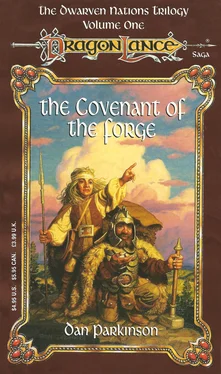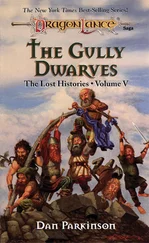Dan Parkinson - The Covenant of The Forge
Здесь есть возможность читать онлайн «Dan Parkinson - The Covenant of The Forge» весь текст электронной книги совершенно бесплатно (целиком полную версию без сокращений). В некоторых случаях можно слушать аудио, скачать через торрент в формате fb2 и присутствует краткое содержание. Жанр: Фэнтези, на английском языке. Описание произведения, (предисловие) а так же отзывы посетителей доступны на портале библиотеки ЛибКат.
- Название:The Covenant of The Forge
- Автор:
- Жанр:
- Год:неизвестен
- ISBN:нет данных
- Рейтинг книги:5 / 5. Голосов: 1
-
Избранное:Добавить в избранное
- Отзывы:
-
Ваша оценка:
- 100
- 1
- 2
- 3
- 4
- 5
The Covenant of The Forge: краткое содержание, описание и аннотация
Предлагаем к чтению аннотацию, описание, краткое содержание или предисловие (зависит от того, что написал сам автор книги «The Covenant of The Forge»). Если вы не нашли необходимую информацию о книге — напишите в комментариях, мы постараемся отыскать её.
The Covenant of The Forge — читать онлайн бесплатно полную книгу (весь текст) целиком
Ниже представлен текст книги, разбитый по страницам. Система сохранения места последней прочитанной страницы, позволяет с удобством читать онлайн бесплатно книгу «The Covenant of The Forge», без необходимости каждый раз заново искать на чём Вы остановились. Поставьте закладку, и сможете в любой момент перейти на страницу, на которой закончили чтение.
Интервал:
Закладка:
Once, then, Grayfen had been truly blind … before the double-pointed spear that took his eyes gave him new ones and the power that went with them. Once, years ago and very far away, in a place called Kal-Thax, Grayfen had known the darkness. It was a dwarf who had blinded him. Now it would be dwarves who paid the price.
Kalil the herdsman had spent the day driving his flock up from the meadows above the Hammersong, and as the Suncradles swallowed the light of full day, he chased the last ewe into the pen and closed the gate. Though his legs ached from the day’s work, Kalil was pleased. The flock had grazed well on the rich meadows. They were fat and frisky, and their wool was prime.
Far up the mountains, the drums had begun their call. Balladine was at hand. Tomorrow, Kalil would select the best animals from his herd and take them to the village, to join the trek from Golash to Thorin. Trading should be good this year; he knew the Calnar needed wool and mutton. Even after paying his trade-share to Garr Lanfel, Prince of Golash, Kalil expected to have a purse bulging with dwarven coin — and maybe a bit of dwarven steel as well.
Securing his gate, Kalil turned toward his herdsman’s shack and was nearly there before he looked up and stopped, startled at what he saw. In front of his house stood a tall, gold-and-white horse, head-down and streaked with sweat. It was clearly a dwarven horse — no one but the dwarves bred and used the huge, white-maned Calnar horses. It wore a saddle of dwarven design, richly studded with steel and silver, and its loose reins dangled from its headstall.
Quickly, Kalil glanced about, his hackles rising, half expecting to see a Calnar soldier nearby. Like most of the humans of the Khalkist realms, Kalil accepted the dwarves of Calnar. He looked forward to trading with them, and he didn’t mind mingling with them — on their lands — during the Balladine. But, like most humans, his regard for the Calnar was tempered by a deep-seated dislike born as much of envy as of the difference in their appearance from his own.
The dwarves were rich. He had never encountered a dwarf who wasn’t rich. The dwarves made steel, and they used steel, and there was — it seemed to Kalil — a certain arrogance in the casual way the short, stubby creatures displayed their wealth. It made him feel very poor by comparison.
They were ugly little creatures, to Kalil’s human perception, and they were arrogant and obviously selfish, since they seemed always to be wealthier than anyone else. The idea of a dwarf being here — at his home — irritated him as much as it startled him.
But there was no dwarf around. There was only the huge, tired horse standing in Kalil’s dooryard, and he approached it cautiously. “Ho!” he said when it turned its great head to look at him with intelligent eyes. “Ho, stay! Easy now, good horse … stay.”
When it neither bared its teeth nor backed away, Kalil picked up its reins and rubbed its muzzle with his hand. “Good horse,” he crooned, noticing that the bit in its mouth and the studding on its headstall were of fine silver. He looked further. From withers to flanks hung a skirt of delicately worked mesh, with a fine saddle atop. Kalil’s mouth dropped open. The saddle was smeared with dried blood, and the shaft of an arrow jutted upward from its pommel.
For a moment, Kalil had considered trying to return the horse to the dwarves of Thorin for the rich reward they undoubtedly would pay for a strayed animal. But now he changed his mind. To take a dwarven horse to the dwarves, its saddle covered with blood and a human-made arrow embedded there, would be worse than foolish. It would likely be the last thing he ever did.
He decided he wanted nothing to do with this horse. Still, its trappings were of the finest dwarven craft. The steel parts alone were worth a small fortune in human realms.
Glancing around furtively, Kalil set about relieving the horse of its burdens. Saddle, bridle, headstall, and mail skirt he removed, along with the pack behind the saddle and the saddle blanket, which was of fine, woven suede. He carried his prizes to his hay shed and hid them there. Tomorrow he would bury them — or most of them — to be recovered later.
When he came out, the horse was still standing beside his house, nibbling at his thatch roof. “Here!” he snapped. “Leave that alone!”
The horse backed away, staring at him, and then, as though it had tolerated all the human company it cared to, it turned and trotted away, up the hill.
“Good!” Kalil breathed. “Good riddance. I don’t need Calnar horses here. Life is trouble enough, without dwarf trouble.”
4
The great hall called Grand Gather was the heart of Thorin Keep. Here, where ancient ogres had squared out a huge cavern for their deepest lair, the delving Calnar had begun the remodeling and expansion from which Thorin grew. Gone was the blocky, monotonous architecture of the ogres. The only remaining trace of ogre origins was the sheer size of the vast chamber.
Grand Gather had been reshaped by the dwarves into a huge amphitheater with rings of steps rising from an arena floor. It was literally the heart of Thorin, because it was from here that all the later delvings of the city within the mountain had gone forth — a busy, ever-growing sprawl of levels and ways, warrens and roads, shops and stalls, foundries, factories, smithies, and sprawling residential areas — an entire city within a mountain. Select stone removed from the delvings had gone to construct the twenty-story west wall overlooking the terraces — the only exterior wall in the entire city.
Grand Gather was enormous. Its rising rings of steps, serving as seats for assemblies, could accommodate many thousands. But now there were only a few dozen Calnar in the great chamber. High sunlight, shafting in through the great quartz lenses of sun-tunnels in the vaulted ceiling a hundred feet above, made the day within Thorin as bright as the mountain morning above the Khalkist crags. Great ranks of silvered-glass mirrors directed the light, in Grand Gather as elsewhere, so that no part of Thorin was ever dark, except at night.
When Colin Stonetooth entered Grand Gather, striding down the steps on powerful, stubby legs, some of those waiting below stood, and a few saluted. Others didn’t. As chieftain of the Calnar, Colin Stonetooth had little use for ceremony, unless it served a practical purpose. Today there were no visiting delegations to impress, no games or entertainments to applaud. Nothing was scheduled here today, and the message from the captain of guards, requesting the chieftain’s presence here, had been terse and without explanation.
Colin entered through the west passage, the Ten following him as they always did. They had all been out on the terraces and still wore their riding gear. The Grand Council table, a seven-sided table of polished oak wood, twelve feet across, had been placed in the center of the arena with benches around it. The five members of the Council of Wardens waited there, along with several others. Colin was surprised that all four of his children were present, as well as the delvemaster, Wight Anvil’s-Cap, and the marshal of the keep, Coke Rockrend. Beyond the table, big Willen Ironmaul, captain of guards, waited with a cluster of his warriors. They formed a tight ring, some facing inward, and Colin squinted, trying to see who — or what — they were guarding.
At the chieftain’s flank, Jerem Longslate, First of the Ten, muttered, “Something’s afoot, Sire. Coke Rockrend never meets with the council.”
“Neither does Wight Anvil’s-Cap,” Colin pointed out. He raised a hand casually, and the Ten spread out, hurrying to stations around the arena where they could watch the entrances and their chieftain’s back. Never in memory had the Ten been called upon to defend the life of the chieftain of the Calnar, but never did a moment pass when they were not ready to, if needed.
Читать дальшеИнтервал:
Закладка:
Похожие книги на «The Covenant of The Forge»
Представляем Вашему вниманию похожие книги на «The Covenant of The Forge» списком для выбора. Мы отобрали схожую по названию и смыслу литературу в надежде предоставить читателям больше вариантов отыскать новые, интересные, ещё непрочитанные произведения.
Обсуждение, отзывы о книге «The Covenant of The Forge» и просто собственные мнения читателей. Оставьте ваши комментарии, напишите, что Вы думаете о произведении, его смысле или главных героях. Укажите что конкретно понравилось, а что нет, и почему Вы так считаете.












